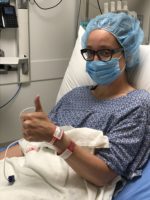by Stacy Quinn, Guest Blogger, Ambassador for Go Red For Women and AHA Northern New Jersey Board Member
On October 29, people around the globe will come together on World Stroke Day to recognize that one in four people worldwide will have a stroke in their lifetime. It’s a special day for me as a stroke survivor, which got me thinking: “What would my current self say to my past self during my health crisis?” I wish I could jump in a time machine, but that’s not possible. So, I thought I’d write a letter to my past self – a girl who brushed off stroke symptoms because she didn’t think stroke could happen to her.
Dear Me: Don’t Die of Doubt
Dear Stacy,
You’re sick and your body is sending you warning signals that something is wrong. Your head is pounding like never before. Your vision is fuzzy. Your stomach is doing summersaults. And you just slurred your speech. Call 911 immediately! You’re having a stroke. I know you think you’re just tired and stressed out, but you can’t go back to your desk and keep working. Please don’t die of doubt.
I know that you don’t think stroke is something that could happen to you. Well, you’re wrong. Stroke doesn’t discriminate. It doesn’t care if you are young, old, fit or sick. Instead of seeking medical attention at a local care center, you should have dialed 9-1-1 immediately. The first visit – they’ll give you some medicine for the headache. The second time – they’ll tell you it’s an ear infection and send you home with more meds. You’re wasting time and the clock is ticking. It’s been 10 days since your initial stroke symptoms. Tick tock. Tick tock. You’re a walking time bomb for a stroke that could leave you with serious health complications or end your life on the spot.
Ultimately, you’ll get to the point where you feel like your head is going to explode. The pain will get so bad that for a fleeing moment you’ll wish that you would die. New symptoms start emerging: stabbing eye pain, worsening vision and a tight, aching neck. Eventually you’ll make a smart decision to call a neurologist and beg him to fit you into his schedule because you can’t handle the pain and exhaustion much longer. He’s a smart man who will end up saving your life. He will order a scan of your neck and brain that will reveal that one of the main arteries that delivers blood between your neck and brain is torn and blocking blood flow to the right side of your brain by 90%.
Hours after having those scans you’ll be rushed to the ER. It’s going to be scary, but it’s important to remember that you’re in a good hospital with a great team of medical professionals who are going to make you better. You need to stay calm, stop crying and not worry. Here are a few reasons why:
- You’re going to be okay. It’s going to take the doctors time to figure out the best treatment. Be patient. And, again try to stay calm. Luck is on your side. You won’t need surgery, and you will leave the hospital with some medications and strict health care rules to follow.
- Some people in your life will disappoint you. You’ll leave the hospital and look the same as you always did. So, people are going to think you’re fine, but you won’t be fine. They won’t understand that your head and neck throb with pain, your balance is way off, you’re struggling to see out of one eye and you’re terrified because you could have another stroke while trying to recover. Many of the people you expect to offer care and support won’t be there for you. That’s because to them, you look fine. On the other hand, some people – unexpected people – will surprise you and be there for you every step of the way on your road to recovery.
- Being healthy and fit helped save your life. I know that you’re angry and upset. After all, you eat healthy, exercise and keep your cholesterol and blood pressure numbers low. You did everything right and still landed in a hospital bed. Had you not done those things, however, you might have died or been left with longer-term – or even permanent – health issues.
- This will change you, and that’s not a bad thing. Your life changed the moment you slurred your speech. At first, you’ll focus on what you can’t do, but you’ll quickly realize that you got the gift of more time in this world, and you’ll be grateful for everything you can do.
- Give yourself time to heal. I know you’ll want to get back to your old self quickly, but I urge you to take it slow. You won’t listen to others, and you’ll go back to work three days after leaving the hospital. That’s something you will regret down the road. Your body and mind need time to heal, and that’s okay.
 Stay strong. This is the beginning of new journey. At first, you’re not going to want to share what happened to you because you’re afraid that people will think you’re broken. But you’ll snap out of that thinking and realize that you have a gift to share – your story. You’ll become an advocate for stroke awareness in young people – and women –and you’re going to help save a few lives because people learn from your experience. Rest well. Things are going to be okay.
Stay strong. This is the beginning of new journey. At first, you’re not going to want to share what happened to you because you’re afraid that people will think you’re broken. But you’ll snap out of that thinking and realize that you have a gift to share – your story. You’ll become an advocate for stroke awareness in young people – and women –and you’re going to help save a few lives because people learn from your experience. Rest well. Things are going to be okay.
– Your healthy and grateful future self
P.S. If you ever have the “worst headache of your life” or any stroke symptoms, get medical attention immediately.
Stacy Quinn is an Ambassador for Go Red For Women and AHA Northern New Jersey Board Member. You can follow her on twitter @Healthy4Good.
The views, opinions and positions expressed within these guest posts are those of the author alone and do not represent those of The American Heart Association | American Stroke Association. The accuracy, completeness and validity of any statements made within this article are not guaranteed. We accept no liability for any errors, omissions or representations. The copyright of this content belongs to the author and any liability with regards to infringement of intellectual property rights remains with them.
The American Heart Association’s blog is not intended to provide medical advice or treatment. Only your healthcare provider can provide that. The American Heart Association recommends that you consult your healthcare provider regarding your personal health matters. If you think you are having a heart attack, stroke or another emergency, please call 911 immediately.
